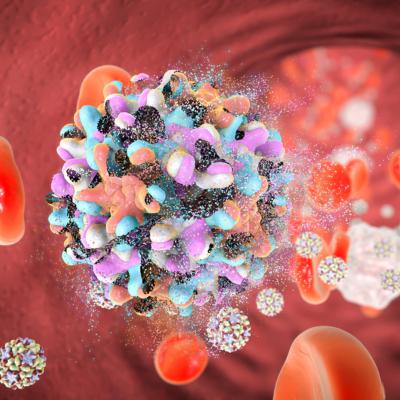Anúncios

The discovery of the hepatitis C virus (HCV) marked an important breakthrough in medicine and virology, ushering in a new era of more effective treatments and diagnostics. The process of identifying HCV was long and challenging, but the use of new laboratory techniques enabled the understanding of a previously unknown virus. With the discovery of the HCV genome, medicine gained powerful tools to combat the infection.
Anúncios
Furthermore, advances in treatment with direct-acting antivirals (DAAs) transformed hepatitis C from a chronic and debilitating disease into a curable condition. These treatments revolutionized the clinical approach, offering patients new possibilities for cure and improving their quality of life. The combination of research and scientific innovation continues to play a key role in the fight against HCV.
How Does the Discovery of the Hepatitis C Virus Work?
The discovery of the hepatitis C virus (HCV) represents a significant milestone in the field of virology and infectious diseases. Initially identified in the late 20th century, the journey to understand HCV began with the recognition of non-A, non-B hepatitis, which puzzled researchers for years. This elusive virus was discovered through a combination of serological and molecular biology techniques, leading to the identification of the viral genome. Scientists used advanced methodologies such as cloning and sequencing to isolate the virus, paving the way for the development of diagnostic tests and therapeutic interventions.
In 1989, a breakthrough occurred when researchers from Chiron Corporation successfully identified the HCV genome using a cDNA library from infected individuals. This genomic discovery was pivotal, as it not only confirmed the virus’s existence but also enabled the development of blood tests for HCV screening. The ability to accurately diagnose hepatitis C transformed the approach to disease management, allowing for targeted treatment strategies and improved patient outcomes. Understanding the virus’s structure and genetic composition was crucial for the development of antiviral therapies, leading to significant progress in the fight against hepatitis C.
The discovery process also involved extensive collaboration among researchers, clinicians, and public health authorities. The global response to the hepatitis C epidemic highlighted the importance of sharing knowledge and resources to combat infectious diseases. As more was learned about HCV, the focus shifted to understanding its transmission, progression, and potential complications. This comprehensive approach enabled healthcare providers to implement effective prevention strategies and improve patient care.
Additionally, the discovery of HCV encouraged further research into the virus’s biology, including its replication cycle and interactions with the host immune system. Understanding these mechanisms was fundamental to the development of new antiviral agents targeting specific stages of the viral life cycle. Ongoing research continues to uncover new insights about HCV, contributing to the broader knowledge of viral hepatitis and its impact on global health.
The Initial Journey to Discover HCV

The identification of hepatitis C began with the analysis of non-A, non-B hepatitis cases. This mystery lasted for years, sparking great curiosity among scientists. The use of new technologies enabled the virus to be isolated and research to advance.
International collaboration was essential in this process, with scientists sharing valuable information. During the 1980s and 1990s, researchers came together to create an efficient diagnostic method. This collective effort was crucial to identifying HCV.
Advances in serological and molecular biology techniques allowed for more detailed analysis of the virus. Genetic sequencing was one of the milestones of this journey, revealing the composition of HCV. This discovery represented a turning point in virology.
Today, the understanding of HCV reflects years of scientists’ dedication. The initial discoveries opened the door to the development of effective therapies. Without these pioneering investigations, many of today’s advancements would not have been possible.
Advantages of Antiviral Treatments for Hepatitis C
Antiviral treatments for hepatitis C revolutionized the management of this viral infection, offering patients a path to cure and significantly improving their quality of life. One of the main advantages of these treatments is their high effectiveness. With the advent of direct-acting antivirals (DAAs), cure rates have soared, with many patients achieving sustained virologic response (SVR) after completing a short course of therapy. This remarkable success has transformed hepatitis C from a chronic and potentially fatal condition into a manageable disease.
Another significant advantage of antiviral treatments is their relatively favorable safety profile. Unlike previous therapies that often involved interferon, which was associated with numerous side effects, modern antiviral regimens are generally well tolerated. Patients can often complete their treatment with minimal disruption to their daily lives, making adherence to therapy more feasible. This ease of use has been a game changer, especially for individuals who previously might have avoided treatment due to concerns about side effects.
The accessibility of antiviral treatments has also improved significantly in recent years. With the introduction of generic formulations and increased competition among pharmaceutical companies, treatment costs have decreased, making it more accessible for patients around the world. Public health initiatives and global partnerships have further facilitated access to these life-saving medications, especially in low- and middle-income countries where hepatitis C prevalence is high.
In addition to the immediate benefits of cure and symptom relief, antiviral treatments for hepatitis C have broader implications for public health. Achieving high cure rates among infected individuals helps reduce the overall disease burden in the population. This not only decreases the incidence of liver complications such as cirrhosis and hepatocellular carcinoma but also minimizes the risk of transmission to others. As more individuals are cured, the goal of eliminating hepatitis C as a public health threat becomes increasingly attainable.
How to Understand the Discovery of the Hepatitis C Virus and the Cure Through Antivirals

Understanding the Discovery Process of the Hepatitis C Virus:
The journey to discover the hepatitis C virus involved meticulous research and collaboration among scientists. It began with the recognition of non-A, non-B hepatitis, leading to the identification of the viral genome. This foundational knowledge underpins current diagnostic and treatment strategies.
Exploring Antiviral Treatment Options for Hepatitis C:
Antiviral treatments have significantly evolved over the years. Direct-acting antivirals (DAAs) have emerged as the standard of care, offering high cure rates and fewer side effects compared to older therapies. Understanding these options is crucial for patients seeking effective treatment.
The Role of Hepatitis C Genome Analysis in Treatment:
Genome analysis plays a vital role in personalizing antiviral therapies for individual patients. By examining the virus’s genetic makeup, healthcare providers can select the most effective treatment regimens, increasing the likelihood of achieving a cure.
Advances in Hepatitis C Cure Research:
Ongoing research continues to explore new antiviral agents and treatment combinations. These advances aim to improve cure rates, shorten treatment duration, and address challenges posed by viral resistance, ensuring patients have access to the most effective therapies.
Clinical Trials and Their Impact on Hepatitis C Patient Outcomes:
Clinical trials are essential for evaluating the safety and efficacy of new treatments. Participation in clinical trials not only provides patients with access to cutting-edge therapies but also contributes to the broader understanding of hepatitis C management.
The Future of New Antiviral Drugs for Hepatitis C:
The hepatitis C treatment landscape is constantly evolving, with promising new antiviral drugs on the horizon. These innovative agents have the potential to further increase cure rates and improve treatment options for diverse patient populations.
Understanding the discovery of the hepatitis C virus and the subsequent development of antiviral treatments is crucial for both patients and healthcare providers. Collaborative efforts in research and innovation have led to significant advances in managing this viral infection, offering hope to millions affected by hepatitis C.
Did You Enjoy Learning About the Discovery of the Hepatitis C Virus and the Cure Through Antivirals?
Learning about the discovery of the hepatitis C virus and the advances in antiviral treatments offers deep insight into the complexities of infectious diseases and the relentless pursuit of medical science. The journey from the initial identification of HCV to the development of highly effective treatments demonstrates the power of research, collaboration, and innovation in addressing public health challenges.
As we continue to explore the intricate issues of hepatitis C and its management, it becomes clear that there is still much to learn. Ongoing research and developments in antiviral therapies not only offer hope to those affected by the virus but also inspire a collective effort toward the ultimate goal of eradicating hepatitis C worldwide.
Frequently Asked Questions
What was the discovery of the hepatitis C virus?
The discovery of the hepatitis C virus happened in the late 1980s. Researchers were trying to understand why many cases of hepatitis were not caused by Hepatitis A or Hepatitis B.
How do antivirals cure hepatitis C?
Antivirals work by blocking the virus. They prevent the virus from multiplying in the body. With treatment, your body can get rid of the virus!
What antivirals are used to treat hepatitis C?
There are several antivirals, such as Sofosbuvir and Ledipasvir. These medications are very effective and help cure hepatitis C.
Is hepatitis C cure guaranteed?
Yes! Most people are cured with antiviral treatment. The medications have a very high success rate!
How do I know if I’m cured of hepatitis C?
After treatment, blood tests are done. If no virus is detected, you are cured!
